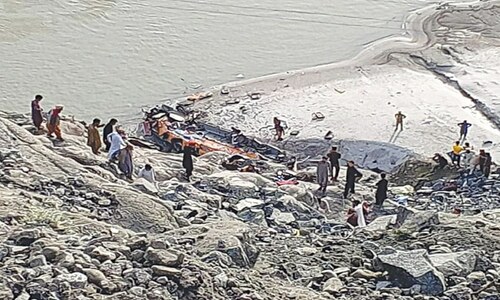ONE of our teachers who had fled Lahore and settled in London before the glasnost in the 1980s had his own yardstick for measuring progress. He would routinely ask visitors from Pakistan: “What is the son of Mr A doing? How far has the daughter of Mr B gone in life?” “Achcha!” he would sigh whenever the answer did not quite match up to his expectations, which was quite often. “This is hardly evolution.”
The uncertainty the professor sahib’s inquisitive nature brought into a conversation about generational improvements is a feature of Pakistani politics. Pakistanis looking for evolution of politics invariably begin with a rejection of dynasty, in favour of a real political party.
But since it doesn’t work out this way here, their focus then shifts to locating the signs of brilliance in a political heir who they cannot do without: a successor who has some fire in his belly, a rebellious streak early on before he settles into his due place on the throne, leaving the rebellious job to his offspring. A bit like Jahangir as he stood against Akbar, even if in the fictionalised confrontation over Anarkali, in a blossoming of the motley crowd’s hope of achieving equality.
It is a difficult act to balance – carving out a niche in a running dynasty without disowning the benefits of royal lineage. Too much emphasis on the old rules could compromise the freshness of a Hamza Sharif or a Moonis Elahi.
Hamza is the next Sharif choice for the Punjab throne. Uncle Nawaz Sharif, apparently the inspiration behind Hamza’s speech and mannerism, has his eyes set on a third term as prime minister. Hamza’s father, who simply loves challenges, has dedicated the next few years of his life to resolving the energy crisis in the country. This leaves the Takht Lahore unattended, unless of course we see the truth and recognise Hamza Shahbaz as the rightful claimant from the incumbent royal family.
For the time being, Hamza, along with his cousin Maryam Nawaz, is assigned to delivering the youth from Imran Khan’s spell and to the family camp. But more than being a carrier of young dreams he promises continuity, which may be a slightly problematic slogan for those edging to rise in revolt, or who have already revolted, against the imprint of the old.
Moonis Elahi’s case is similar: he is there to facilitate continuity with a few innovations here and there rather than symbolise a transfer of the baton from one generation to another. It took his elders decades to overcome the mental block which prevented them to locate the potential power ally in Punjab in the PPP. And, while they may flash Moonis from time to time as a blend of tradition and modernity, they are in no particular hurry to give up their conventional style of politics and not ready to allow him to lead a surge towards the modern.
It could also be that the young man’s flight has been checked by circumstances. His trial in a corruption case was a setback just when Moonis was appearing to warm up to his role as a backup to the politics of his father Pervaiz Elahi and uncle Shujaat Husain. For the moment, Pervez rules with Shujaat at hand to give his blessings.
Maybe a role in the opposition, which actually doesn’t look too distant, would help Moonis Elahi discover his true mettle. It is far easier for a young scion with right pedigree to get noticed when he is spewing venom at those in power, rather than having to defend a legacy blotted by years in power. Shahzain Bugti and Akhtar Mengal in Balochistan both have a big enough cause to lead their dynasties into battle.
Incumbency is a problem Moonis shares with Bilawal Bhutto Zardari, the heir to the biggest dynasty in Pakistan whose kingdom is showing grave signs of falling apart. Since the desperation in the PPP’s ranks is most obvious, the calls for Bilawal to be his own man and his own leader are the loudest. It is said that for the PPP in vast areas of the country, it is ‘do or die’ – the all too frequently discussed connotations of this expression signifying the toughness of his task.
Bilawal appears to be sufficiently unhappy yet at the same time he is over-trained and overseen to an extent which can leave wards under-prepared. In the conversations of his subjects, he quite often emerges as the Saleem who must this time rescue his dynasty from the effects of experiments done in Akbar’s tradition of mixing incompatible materials together in the hope of creating a new whole. Reconciliation, the formula was officially named this time.
The concept has cost the PPP dear and, it seems, it is yet to be given up by the presidency. Consequently, constrained by the militant threats, Bilawal Bhutto Zardari is further prevented from taking on outside elements who he should be logically taking on now to revive hopes for his dynasty. Whether he has the ability to turn things around will only be known once he begins – or is allowed to begin -- the job in earnest.
One other dynasty in a somewhat similar situation, the Walis in Khyber Pakhtunkhwa, has been forced to withdraw from the frontline their new face, Aimal Wali Khan. The ANP chief has instead relied on his nephew, Amir Haider Hoti, to carry Bacha Khan’s flag forward – the pragmatic mama-bhanja (uncle-nephew) partnership being a more successful re-run of an alliance that once tried to take on the developing Sharif empire in Punjab. The partnership comprised Makhdoom Hasan Mahmood and Syed Yousaf Raza Gilani.
Gilani, the nephew in that team, has since grown up from his princely status to have a dynasty of his own. While, on the national stage, he has been reduced by law to play more of a ceremonial queen mother, two of his sons and a brother are contesting national seats in Multan. His famous uncle’s family in Rahim Yar Khan is not doing all too bad either. Gilani’s cousin Makhdoom Syed Ahmed Mahmood is the governor of Punjab and two of Mahmood’s sons are contesting national seats in native territory.
Similar local dynasties dot Pakistan with the same frequency with which the districts appear on the country’s map. Each district has a few of them, and stints through various parties are to them like the conquests young princes of the past would be sent on as part of their training. They take on each other, and sometimes some of them collect in a party to weigh it down rather than boost it.
The PPP was recently on a spree to absorb the big families of Sindh. In the end it got more than the Zardari kingdom could reconcile with. Many of the local ruling families left, but still, downwards from Sukkur where Khurshid Shah and family are in the run as well as upwards into southern Punjab, the PPP’s list of the candidates reads like an edition of chiefs of Pakistan.
Many of these families were forced to introduce new faces in recent years, primarily because of Gen Musharraf’s BA degree clause. Some of these new faces have hung around even though the clause is there no more while in some cases the elders have returned to the contest: like in Muzaffargarh where Hina Rabbani Khar, who was confronted with the threat of a vicious campaign, has been replaced by her father, Noor Rabbani Khar.
All these families have a legacy to guard and build upon. Bilawal Bhutto has two to choose from. The jiyalas, many of them heartbroken and in need of some magical potion to revitalise them, would want him to somehow bypass the five-year rule of the party and find a way to connect directly with his mother, Benazir Bhutto. In between stands a party that has been transformed vainly waiting for the fruits of the particular brand of reconciliatory and defensive politics played by Bilalwal’s father, Asif Zardari. If that is not a legacy big enough to deal with in between also stands a government that is extremely difficult to defend.













































